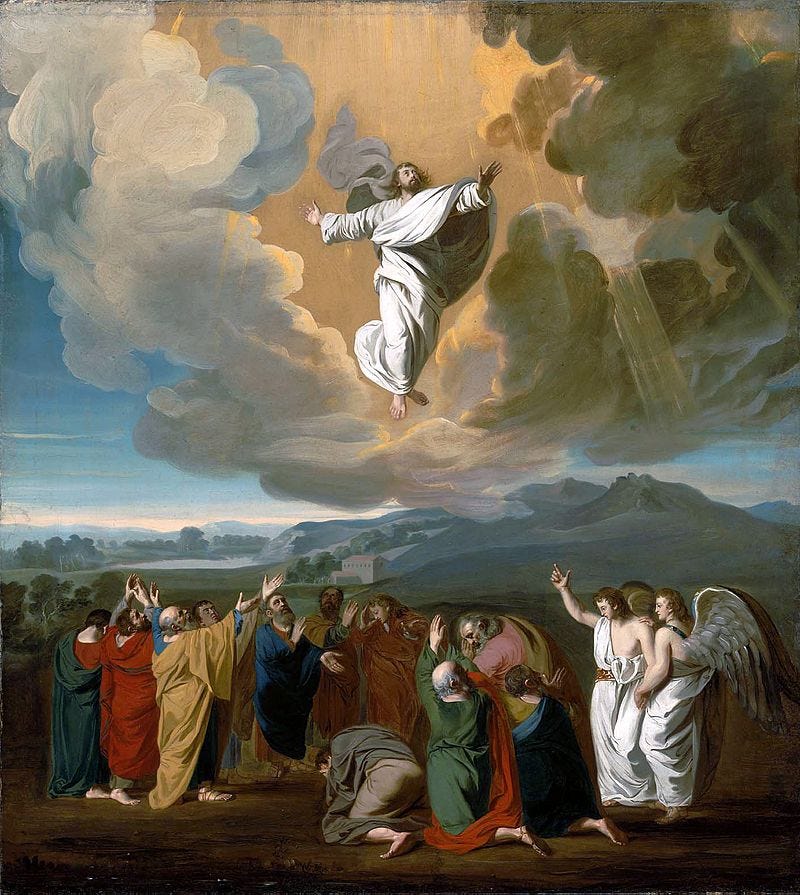The Queen really gets what it is to be Christ-like
To ascend to a throne is to commit to servant ministry, writes George Pitcher. It would be well for politicians to follow her example
I confess that I have always struggled with the Ascension of Our Lord Jesus Christ. It’s not so much that the risen Christ goes to be with God – a problem with that really would be a crisis of faith. It’s more the way it’s described.
Earlier in the story, scripture has a stark, human reality to the crucifixion and the first encounters with the risen Christ – especially Mary Magdalene at the tomb and on the road to Emmaus. But last week’s Ascension Day always brings to my mind a magic trick, an act of levitation, a sort of David Copperfield illusion.
In art, it’s made worse by the figure of Jesus appearing to be on an invisible escalator, disappearing into swirling clouds, as if heaven is some kind of sky-based destination, rather than what his divinity has created as work-in-progress to be built on earth.
Metaphor rather collapses at this point of our story. But it’s helpful perhaps to think of what ascension to a throne means in the context of a new rule of God, the new covenant with the world, the divine contract that is completed with the celebration of Christ’s ascension last week and the coming of the Holy Spirit at Pentecost next Sunday.
And also, in this context, it’s far from heretical to consider all this in the context of our Queen’s ascension to her throne, the 70th anniversary of which we celebrate this week. Not only is she Supreme Governor of the Church of England, and therefore its most senior earthly boss, but I want to suggest that, by conflating these two ascensions, we might learn a bit more about what they both mean, in terms of a lived life with God, in this one and the next.
Christ the King
First, to the “royalty” of Jesus Christ. The Johnny-come-lately Feast of Christ the King, instituted by Pope Pius XI in 1925, has given us a whole load of stained glass with orbs and crowns and sceptres – all the usual flummery and props of earthly sovereignty.
This all flies in the face of the Christ’s sacramental injunctions that the greatest among us must become the least, that it’s in servant ministry that the love of God is glorified and that those who exalt themselves as mighty can expect to be put down from self-made thrones. It’s why he insists on washing his disciples’ feet at his last supper, rather than the other way around.
It follows that to be with God is not to float away to some heavenly realm, to sit on one side of a throne, like the Queen’s son and grandson did at the last state opening of parliament. It’s to live with him here, to make that love and service real in this life, rather than the next.
Our Queen gets it
It seems to me that our Queen, as head of our national Church, absolutely gets that. Sure, our monarchy is surrounded by the pageantry and flummery of tradition. But 70 years ago she notably undertook to serve her nation and its people – not demanding that that equation was reversed – until the day she dies.
Her reign has been a tough ride, through social and political transitions that make her position very different from the one to which she ascended. But she has singly honoured that original promise, with a life of devoted service that some other members of her family have very publicly failed to match.
That, in every sense, has made her defender of the faith, because she’s a living example of how faith in the Christ requires the rich, powerful, privileged and exalted to invert what had been the natural pre-Christian order – that wealth and power were signs of being favoured by God. In short, that means that worldly ascension requires holy descension (note, not condescension) to serve the needs of those who have the least.
Public service
The contrast with the current political dispensation in the UK couldn’t be greater. One can never be sure, but when the Queen ascended to the throne in 1952, I rather assume that the majority of the politicians who took an oath of allegiance to her were more interested in public service than serving their own interests.
The reverse now seems to be the case. And that’s what many of them unwittingly may mean when they speak of “living in a post-Christian society”.
More’s the pity, I say. We can overdo the comparison of ascension to heaven with ascension to the throne of the UK (it’s no part of my intention, to be sure, to argue the case for the divine rights of monarchies). But it does make sense, for me at least, to bring the ascension of the Christ back, as it were, into the world.
Because that has one final implication. Those who live their lives in public service, theologically speaking, create little outposts of heaven in the world. In a sense, they make heaven and earth co-extend. Their transition between the two becomes entirely rational because they’re a living embodiment of both (as the Christ was and is), both in their lives and in their passing.
That’s as true of the Queen as it is of anyone. Whether you’re a person of faith or not, or a monarchist or not, we can all recognise a life lived like that. To paraphrase the poet Philip Larkin, what will be left of her and the rest of us when we ascend to the throne of thrones is love.
George Pitcher is a visiting fellow at the LSE and an Anglican priest.
A version of this column appeared on Premier Christianity




